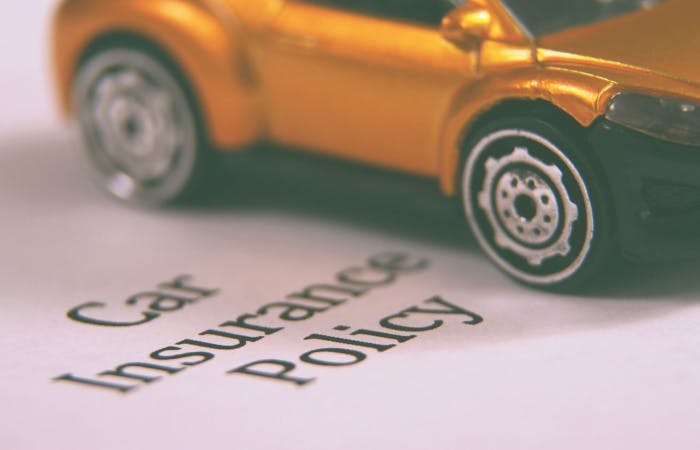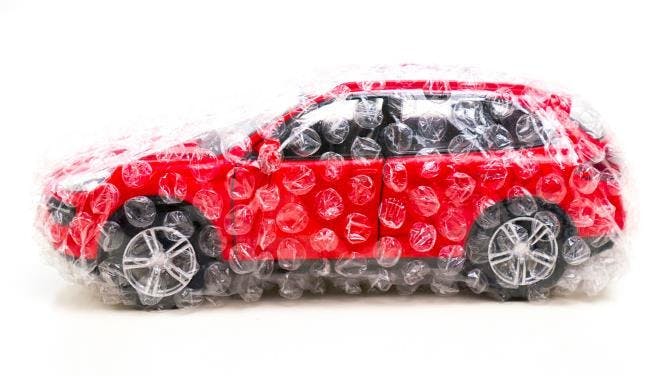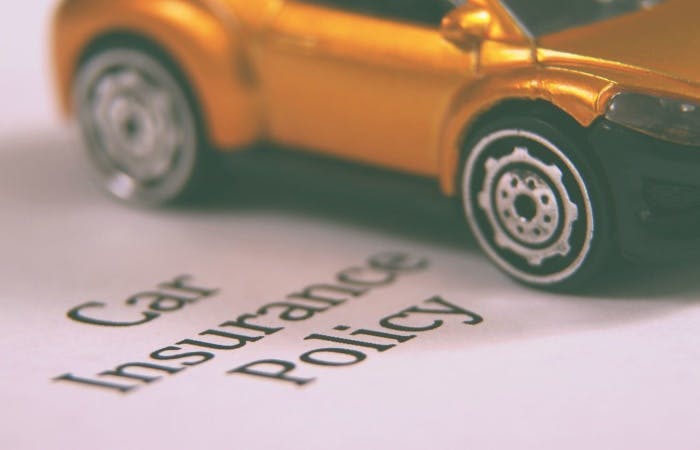Black Box (Telematics) Insurance—Everything You Need To Know
January 29, 2024
•13 min read
Leon McKenzie
Content Writer

Whether you're a newly qualified driver looking for insurance for the first time, or are simply looking to renew your current insurance policy, you might be wondering if there are ways to reduce the cost. After all, depending on your level of experience and a variety of other factors, you could end up having to pay eye-watering premiums. Black box (telematics) insurance might be the perfect solution.
Taking your driving ability into consideration, your insurer will objectively determine how safe a driver you are and offer lower premiums. In this guide, we'll explain what black box (telematics) insurance is and how it works. We'll also discuss which drivers will benefit most from it, whether it's truly worth it and much more!
What is black box (telematics) insurance?

If you've been delving into the realm of driving insurance, you'll have probably heard of black box or telematics insurance. These two terms refer to the same type of policy, with some insurers preferring to call their policies black box and others opting for telematics. There's absolutely no difference between the two.
Black box insurance stands apart from other types of insurance. In addition to the other factors that are usually taken into account when calculating insurance premiums (age, location, experience etc.), black box insurance also looks at how you drive. It uses a black box—or similar type of device, as will be discussed in the installation section—which will transmit your driving data, via GPS, to your insurer every time you're out and about in your car. Using this information, your insurer will be able to assess how risky you are to insure.
If you've got a variety of bad habits, for example, then they're obviously going to hit you with higher premiums. If, however, you're a safe driver, you'll see a reduction in premiums.
How does it work?
As we've said, your telematics device will record your driving data, which will then be used by your insurer to determine your driving score. The better your driving score, the lower your premiums will be. There are many factors that will be factored into this score and the cost of your insurance. Here are a few examples of what your insurer will be monitoring if you do opt for a black box policy:
Braking habits
The way that you brake tells your insurer a lot about you as a driver. If you brake in a timely fashion on approach to a junction or in response to a hazard, then it tells the insurer that you're aware of your surroundings and display good judgement.
If, on the other hand, you tend to brake suddenly or harshly, it gives your insurer the impression that you have dangerous tendencies on the road.
Speed
Speed limits aren't just a suggestion—they're in place for a reason. By using GPS, your insurer can track where you're going and which speed limits apply on the road you're on. If you always stick to the speed limits, you're at a much lower risk of getting into an accident.
If, however, you tend to ignore speed limits, you'll see your driving score decrease. You might even have your insurance cancelled if you're caught speeding on a regular basis.
Time of the day
As you'd imagine, the time of day tends to have an impact on the likelihood of you getting into an accident. If you tend to only drive during rush hour or at night, you're at a much higher risk on the road.
If, on the other hand, you tend to avoid rush hour and don't often drive at night, you'll be seen as much safer to insure.
Mileage
Insurers will ask you how many miles you think you'll drive in a year so that they can adjust your premium accordingly. With a black box policy, your insurer will be able to monitor how many miles you've driven and be able to tell if you're close to surpassing the estimate you gave. If you are close to going over your estimate, your insurer will let you know and usually allow you to extend your mileage—for a fee, of course!
Number of journeys
Insurers have found that drivers who take shorter journeys, e.g., to a corner shop, are more likely to be involved in an accident than those who take longer ones.
Not only will you be monitored on the length of your journeys, they'll also look at the frequency—you're more likely to get a better driving score if you combine your journeys, e.g., instead of going back and forth, you should take care of everything in one go.
Vehicle location
When filling out insurance forms, you'll have to disclose where you live and where you keep your car. If your car is often parked in an area with a high crime rate, your driving score will suffer as a result. Now, some factors simply can't be helped. If you work at certain hours, then you'll have no choice but to travel during rush hour. Similarly, unless you want to up and move to an area with less crime, you can't alter your location. You can, however, take care to adjust factors like braking habits, speed and mileage.
Please note, your black box will be monitoring your driving 24/7. If you share the car with someone else, their driving will contribute to the score. If the other driver's not that great on the road, then we'd advise you figure something else out.
How do I get rewarded?
Once you start driving with your black box policy, your insurer will begin using your driving data to create an impartial driving score. This driving score will constantly be changing as you drive. If you take the above factors into consideration and adjust your driving accordingly, you'll achieve a better score. If you don't, then your driving score will decrease.
The reward for a good driving score will vary depending on the insurer. Example rewards include:
- Returning part of your premium at your renewal stage
- Giving you bonus miles (awarded monthly or quarterly)
- Giving you a reward at your renewal stage
Penalties for bad driving, on the other hand, will usually just involve increased premiums. Of course, if you're considered a dangerous driver, your insurer might just cancel your cover altogether.
How is it installed?

The installation process involved in black box insurance actually depends on the type of telematics device used by your insurer. Despite the name, it's not always a black box. There are a few options available...
Black box
As the name suggests, this involves a small black box being fitted to your car. The location of it will vary depending on the car model and insurer—it could be fitted to your dashboard, bonnet or anywhere else of their choosing. It will be out of sight, though, making it difficult to find and even more difficult to tamper with.
You don't have to worry about fitting it yourself—your insurer will send an engineer to do it. Whilst it won't cost you a penny to install, you will have to pay a fee if you miss the appointment or change cars.
You might be tempted to tamper with your black box in order to fool your insurer into thinking you're a safer driver than you are. If you do, however, you will be penalised for it—either with a fine or by having your insurance policy cancelled.
Plug-in box
Instead of having to wait around for an engineer to fit your black box, a plug-in box is as straightforward as it sounds. All you've got to do is plug it in to your OBD, USB port or 12V adapter. It's just that simple! Plus, unlike regular black boxes, you can move the device yourself, which is great if you get a new car. Of course, you would still have to let your insurer know that you're changing cars.
Mobile phone app
Pretty much anything can be done on your phone now and black box insurance is no different. Some insurers will give you the option to download an app that will monitor your driving data. These apps will be able to sense when you start driving. Be aware, however, that some might get a bit confused with tram or train journeys, or when you're getting a lift from someone else, so be sure to switch it off!
Whilst you don't want the app to get confused when you're on public transport or travelling with someone else, you need to make sure you're not switching it off when you're driving. Whether intentional or not, this would breach your black box insurance conditions. You don't want to invalidate your insurance for such a silly mistake!
Can I monitor my own data?
Depending on the insurer, you'll be able to view all of your driving data via an online account or an app. This will be incredibly beneficial. After all, every driver on the road has some room for improvement!
When you look at the data that has been compiled and your overall driving score you'll be able to see which areas you need to work on—for example, if you have a habit of braking sharply or driving around corners too quickly. Indeed, telematics is a great way of pushing you to become the safest possible driver you can—with a monetary incentive, of course!
Getting black box insurance

Who is it aimed at?
Black box (telematics) insurance is for people who want to reduce their insurance premiums and are willing to change their driving habits to do so. Typically speaking, black box insurance is usually aimed at young drivers. As a high-risk age group, young drivers have to pay higher insurance premiums.
With a telematics policy, however, young drivers can prove to insurers that they're not risky to insure and, hopefully, reduce the cost of their insurance. That being said, there's no reason as to why older drivers shouldn't look at black box insurance. Though it's most cost-effective for young drivers, older drivers can still reap the benefits. This is what Compare The Market found with age and black box insurance:
"Quote comparisons from October 2018 to December 2018 show that a black box insurance policy was the most affordable option for 68.1% of drivers 17-24. This figure drops substantially for older drivers, but drivers between the ages of 30 and 39 still found that black box policies were cheapest in 18% of quote comparisons. Even 12.2% of drivers aged 40-64 found they could get a cheaper quote with a telematics policy."
If you're a safe driver, or you're willing to stay on the ball and iron out your bad habits quickly, a telematics policy could help save you a lot of money.
How do I apply for it?
The best way to buy any type of insurance—black box insurance included—is to head to compare your options. Make sure you check out the main specialist providers, and then rather than trawling the internet for the cheapest deal yourself, you can get someone else to do it for you. There are plenty of top comparison sites available alongside the specialists, with our recommendations being:
Whilst most providers offering black box insurance will be using the same kind of technology to monitor drivers, the intricacies of their policies will vary. Some insurers will ask you to opt-in to curfews, such as no driving between 10pm and 4am—violating these will negatively affect your driving score. Other insurers will give you an annual mileage allowance, but offer bonus miles to safe drivers.
With so much on offer, it's important that you not just take the cost into consideration, but also the rewards and restrictions in place. You can find more information on this by reading up on what to check for when you're buying car insurance.
Is black box insurance worth it?
It depends. Some black box insurance policies will be much cheaper for you than traditional insurance cover. Of course, you might find the opposite to be the case. There are absolutely no guarantees with black box insurance. You might consider yourself to be a safe driver because you've never been in an accident, only to be hit with high premiums because your black box has picked up on some bad habits. Still not sure if black box insurance is for you? Check out some additional advantages and disadvantages...
- You can potentially save money. If you keep an eye on your data and alter your driving habits accordingly, you can prove to your insurer that you're low risk and subsequently reduce your premiums.
- You can become a safer driver. Much like taking a Pass Plus course, black box insurance pushes you to get rid of your bad habits and adopt safer driving strategies. It also helps you build a No Claims Bonus.
- Free anti-theft device. If your car is stolen and you've had a black box fitted, your insurer will be able to tell you where it was last located. Additionally, if you're involved in an accident, it can be used to determine who was at fault.
- You can potentially save money. If you keep an eye on your data and alter your driving habits accordingly, you can prove to your insurer that you're low risk and subsequently reduce your premiums.
- You can become a safer driver. Much like taking a Pass Plus course, black box insurance pushes you to get rid of your bad habits and adopt safer driving strategies. It also helps you build a No Claims Bonus.
- Free anti-theft device. If your car is stolen and you've had a black box fitted, your insurer will be able to tell you where it was last located. Additionally, if you're involved in an accident, it can be used to determine who was at fault.
Other options
If you're a young driver between the ages of 17 and 25, black box insurance is one of the many ways in which you can reduce your insurance premiums. If you don't want to take the risk, however, you can go about reducing the cost of your insurance in other ways. For example, you could increase your excess, add another driver to your policy, choose the right car and much more.
If you're over the age of 25, you might find telematics insurance to be more expensive than traditional insurance policies. In that case, you can use the very same comparison sites we've listed to look for traditional, cheaper policies.
Black box insurance tips

We'll now offer up some tips on how to maintain a good driving score if you do decide to opt for a telematics policy.
1. Keep an eye on your driving score
Whilst this might seem a bit basic and obvious, it will go a long way in helping you get the cheapest premium with black box insurance. By keeping an eye on your driving score, you can see almost immediately if your driving score has dipped at all after driving. If it has, you can then adjust your driving and work on your weaker areas until you improve your score. Remember, those who improve their driving score will be rewarded accordingly!
2. Stick to a sensible speed
It doesn't matter if you've got somewhere to be—speed limits are in place for a reason. As such, it's important that you drive at an appropriate speed and take note of speed limits. After all, speeding could result in you getting a fine and points on your licence—if you're not asked to attend a speed awareness course.
You should also pay attention to road conditions—if it's raining or snowing, you should adjust your speed. Your speed will, of course, also vary depending on whether you're driving in city or rural conditions.
3. Drive smoothly
Whether you're accelerating or braking, you need to do so in a timely fashion—don't just put your foot down suddenly and hope for the best. Pay attention to your surroundings and gauge whether you'll need to take action due to a certain hazard or scenario. Driving smoothly doesn't just benefit you, of course; it's also eco-friendly.
4. Don't follow the crowd
When you're driving, it can be all too easy to just follow what other drivers are doing—it just becomes second nature. Before you know it, though, you'll be driving well over the speed limit, just because that's what other drivers are doing. Remember though: your black box will be recording everything, so you should take care with how you drive.
5. Be open to change
Whilst it might be difficult to believe, not all drivers are perfect on the roads. In fact, we'd go as far as to say that most drivers have plenty of room for improvement. You might feel like you're too set in your ways to start changing the way you accelerate or brake, for example, but you will reap the benefits if you do.
FAQs
Is black box insurance only for young drivers?
Definitely not. Whilst it's typically targeted at young drivers, due to them being such a high-risk age group, it can also be beneficial for those over the age of 25. If you're a safe driver or feel like you could change your driving style to suit the telematics policy, then it's definitely worth pursuing. Make sure that the policy is cheaper though—it can sometimes be more costly for older drivers.
What happens to my driving data?
Your black box data will transmit your driving data in real time to your insurer. They will then use this data to create a driving score. This score will fluctuate depending on factors ranging from your braking style to the length of your driving journeys.
Will my driving data ever be shared?
No. Your insurer will only ever use your driving data to determine your driving score and calculate a subsequent insurance policy price. They will only ever share your information with the police if they are requested to do so as part of a criminal investigation.
Do I have a curfew?
It will vary depending on your insurer. If you do, it won't be a curfew in the strictest sense of the word. For example, your insurer might recommend you not to drive between 10pm and 4am. If you do, however, it's unlikely that your insurance will be revoked. Instead, your driving score will be altered.
Can I look at my data whenever I want?
The point of a telematics policy isn't just to determine the cost of your policy from how you're driving, but also to help you improve your driving. As such, insurers will provide you with an online account or app so that you can monitor your progress. This will enable you to adapt your driving style accordingly and, hopefully, cut down your premiums.
Will I definitely get reduced premiums?
No, there are no guarantees with black box insurance. Even if you consider yourself to be the safest driver on the roads, there's no telling what your driving score will be like. You might never have been in an accident before, but if the black box shows that you have bad habits with accelerating and braking, for example, you'll get a hike in premiums us a result.
Will my insurer be tracking my whereabouts?
Not in the strictest sense. The only time your insurer will be interested in where you're driving is if you're caught ignoring speed limits—your insurer will be able to figure this out because they'll know which road you're on.
What happens if my car is stolen?
If you've got an actual black box fitted, you're in luck. Your insurer, in most cases, will be able to use GPS to figure out the last known location of your black box.
Can I earn a No Claims Bonus with a telematics policy?
It doesn't matter what type of annual insurance you have, it will allow you to earn a No Claims Bonus, as long as you complete the entire year without making a claim. You can then use your NCB when you go and renew your policy.
Can I get black box insurance as soon as I pass my driving test?
Yep—it's pretty much what black box insurance was designed for: new drivers. It's as simple as finding a black box policy that you like and buying it.
Is it worth renewing my black box insurance after a year?
It depends on how you feel about black box insurance and what your insurer is offering. If you find that you've benefited from telematics, then there's no reason as to why you shouldn't continue on with that type of policy.
What happens if I get a new car?
You'll have to let your insurer know if you're changing cars, regardless of whether you have a black box, app or plug-in tracker. If you do need another black box fitted, you might have to pay. Don't try to get away with not informing your insurer. If they find out you've been driving another car without you black box, your insurance will be invalidated.
Young drivers could get cheaper insurance and save over £500 by choosing a black box policy. Data from the Consumer Intelligence price index tells us that the average premium quoted for drivers aged under 25 in the UK is £1735. The average new business premium for Marmalade Black Box Insurance customers, who purchased a policy from 1st July 2020 – 30th June 2021, was £1203.68.
Subscribe for driving advice, offers & more
We'd love to let you know about our courses, news and offers via email. You may unsubscribe at any time.
Star Genie Limited trading as PassMeFast. Company number 10093359
Copyright © 2024 owned by Star Genie Limited
PassMeFast, Blue Tower, MediaCityUK, Salford, M50 2ST
